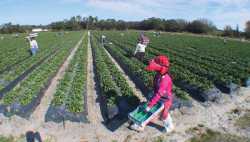Immigration Reform Heads To Senate

Key members of the produce and agriculture industry voiced support of the labor provisions in the Border Security, Economic Opportunity, and Immigration Modernization Act, which was introduced into the Senate on April 17. The legislation includes provisions based on agreements made by the Agriculture Workforce Coalition (AWC), United Farm Workers (UFW), and key lawmakers.
The agriculture component of the bill is part of the larger immigration bill, written by eight senators, including Sen. Marco Rubio (R-FL), Sen. Dianne Feinstein (D-CA.), Sen. Orrin Hatch (R-UT), and Sen. Michael Bennet (D-CO). Rubio penned the agriculture labor portion, called the Agricultural Job Opportunity, Benefits and Security Act or AgJOBS.
United Fresh CEO Tom Stenzel was joined in the presentation of the Senate bill on April 17 by Chuck Conner, president and CEO, National Council of Farmer Cooperatives; Arturo Rodriguez, president, UFW; Tom Nassif, president and CEO, Western Growers; Jerry Kozak, president and CEO, National Milk Producers Federation; Mike Stuart, president and CEO, Florida Fruit and Vegetable Association; and Nancy Foster, president and CEO, US Apple Association.
“Farmworkers are the backbone of our industry,” said Rodriguez. “Here in the United States and a speedier process towards documentation provides an incentive for those farm workers who are currently working in agriculture to continue working in the industry.”
Nassif, who was in direct negotiations with the UFW last week said, “The agreement the Ag Workforce Coalition was able to negotiate with the UFW is a crucial step in solving our immigration crisis and securing a stable and legal workforce in the years to come. Over the past year the agriculture community was able to come together in a historically broad coalition. The force of agricultural producers and worker representatives coming together on a framework will play a significant role in achieving immigration reform this year.”
“A lot of the discussion we had during the negotiation, related to ensuring that we developed an agreement that would allow us to be competitive in the future,” said Stuart “In these discussions I wasn’t concerned about the short term, I was concerned about the long term. Looking toward the future … we’ve structured a program here that will allow this industries, in a competitive environment … will have access to blue card workers particularly during this transitional period and then under the new visa program, access to workforce that will continue to allow the industry to be competitive in what has been, particularly for vegetable commodities in Florida a very competitive environment, with countries like Mexico and others.”
It is estimated that there are 2 million farmworkers in the U.S., with approximately 1.2 million workers undocumented, groups indicated April 17. Currently between 50,000 and 70,000 workers are a part of the H-2A guest worker program. The H-2A program will be rapidly phased out if the immigration bill is passed.
“A major problem is that the current guest worker program, H2A, is broken beyond repair,” said Foster. “This bill sets up a workable program and provides a legal way for undocumented agricultural labor to work on our farms.”
“Each American apple — over 20 billion — must be picked by hand in over 36 states,” said Foster. “Large apple growers typically may need 1,000 or more harvest workers, while smaller growers might only need five or 10. But all together, we need about 70,000 harvest workers each year to get the crop off the trees. Each harvest job supports two to three other jobs … rural American jobs like sales, marketing, and transportation,” she said.
Key Points
Key agricultural labor provisions in immigration reform bill are:
- Current undocumented farmworkers would be eligible to obtain legal status through a new Blue Card program if they choose to remain working in agriculture:
- Ag workers who can document working in U.S. agriculture for a minimum of 100 workdays or 575 hours prior to December 31, 2012 can adjust to this new Blue Card status.
- After a minimum of five years, workers who fulfill their Blue Card work requirements in U.S. agriculture will become eligible to apply for a Green Card, providing that they have no outstanding taxes, no convictions, and pay a $400 fine to demonstrate that they have not committed a crime and have paid all their taxes.
- A new agricultural guest worker program will be established, with two work options:
- An “At-Will” option will allow workers to enter the country to accept a specific job offer from an authorized agricultural employer, under a three-year visa. Employees will then be able to move within the country, working “at will” for any other authorized agricultural employer during that time. Employers must provide housing or a housing allowance to these workers.
- A “Contract-Based” option will allow workers to enter the country to accept a specific contract for a specific amount of work from an authorized employer. This will also provide for a three-year visa, and require employers to provide housing or a housing allowance.
- All guest workers will be paid an agreed-upon wage under the terms of this agreement.
- There is a visa cap for the first five years of the program while current workers are participating in the Blue Card program. The Secretary of Agriculture has the authority to modify that cap if circumstances in agricultural labor require.
- The new program will be administered by the Department of Agriculture.
Also included in the provisions are “specific wages for the new visa holders for various job categories in agriculture,” said Nasif.
E-Verify Provisions
Another component of the immigration bill will be the role of an electronic verification program. The coalition indicated, though, that the legislation is mindful of the broad impact that electronic verification will have on the agriculture industry.
“The legislation specifically contemplates agriculture being moved to what we characterize as sort of the ‘back of the line,’ in terms of that E-Verify enforcement. This was something that was important to us and we felt … small farmers out there oftentimes will have the most difficulty in fully complying with new and sometimes difficult programs like this,” said Conner. “We wanted to give them the maximum time for this new program, both the guestworker as well as the blue card program to be up and running and functioning before they are hit with the E-Verify provisions. We feel like this legislation captures that full effect of giving the maximum time for producers to make sure they understand exactly how these programs work before the enforcement is going to come to the farms and ranches.”
Group Effort
“The introduction of this historic immigration reform bill is due in large part to the perseverance of Senators Feinstein, Rubio, Hatch, and Bennet,” noted Stenzel. “We extend our sincere appreciation for their tireless work to bring compromise to the table to shape a workable labor solution for all of American agriculture.”
Nassif thanked the Senators involved in this effort. “For years, Senator Feinstein has been tireless in her work to achieve solutions for the immigration crisis facing agriculture,” Nassif said. “We commend her for that commitment to our industry. Senator Rubio joined the effort to find a solution last year and has been an integral part in achieving a compromise that both meets needs of agriculture producers and will garner support of Republicans in Congress. Additionally, the more recent participation by Senators Hatch and Bennet has been integral in achieving the agreement.”
Click here to view a copy of the immigration bill introduced to the Senate.









